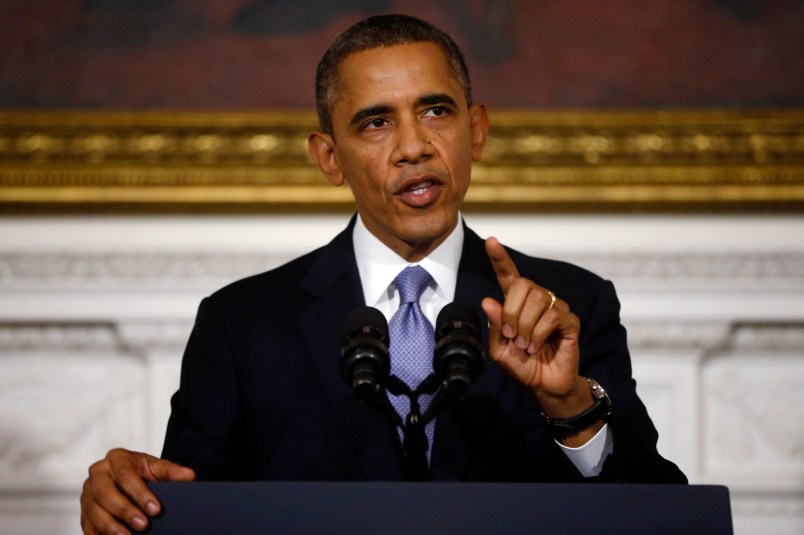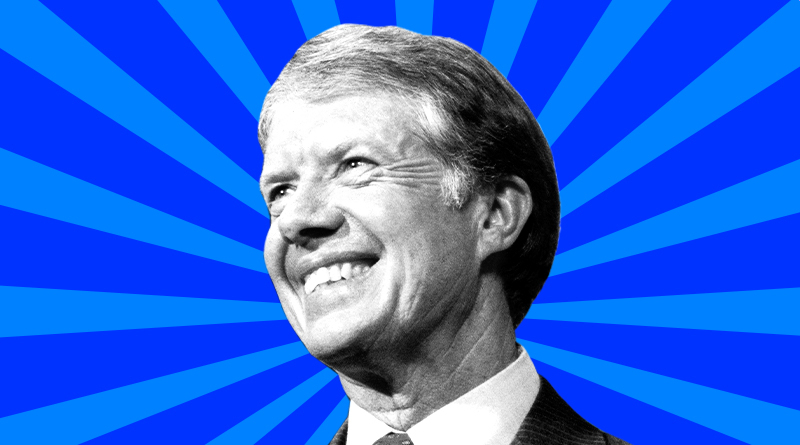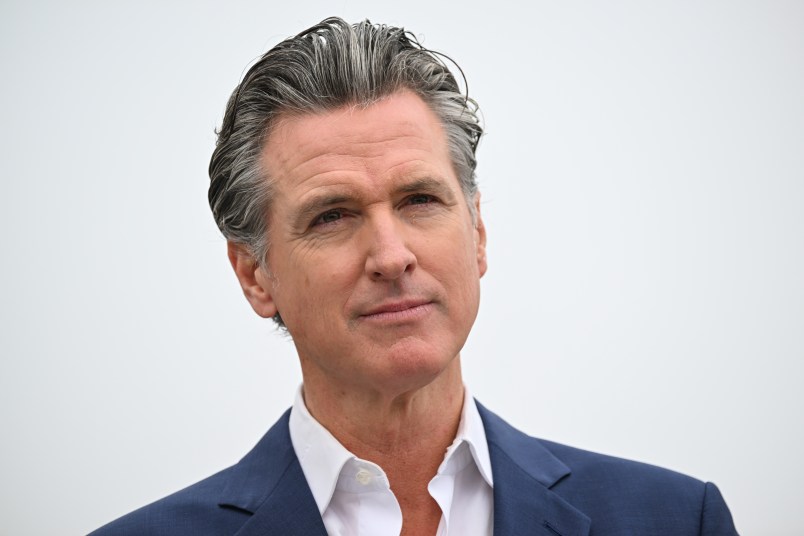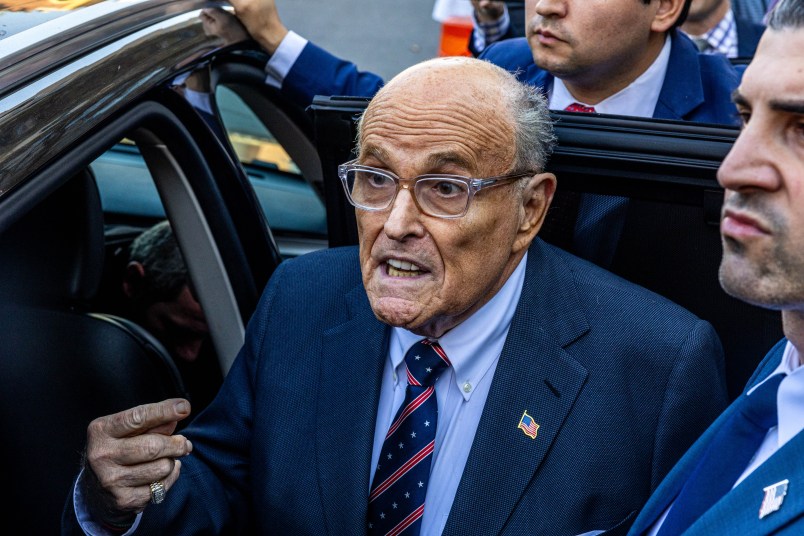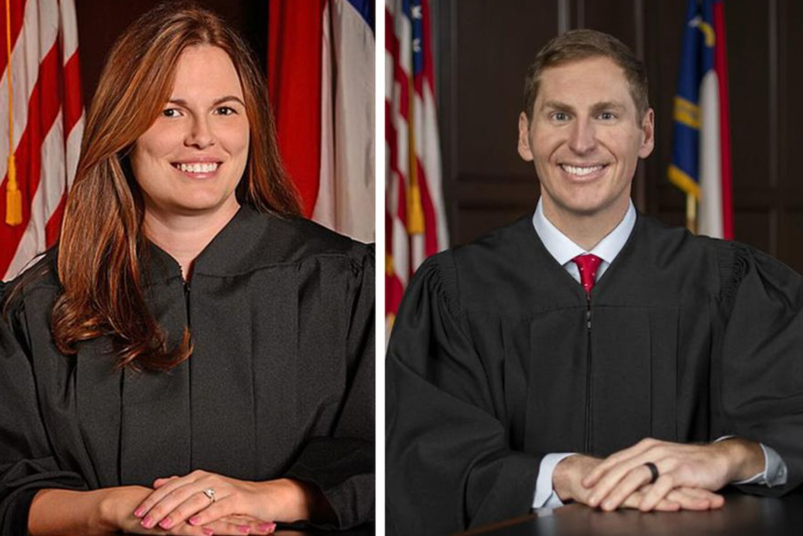NEW YORK (AP) — Regrouping with Democrats after a bitter budget fight, President Barack Obama on Friday cast the recent spending-and-debt standoff with Congress as “a symptom of a larger challenge” but one offering Democrats the chance to show voters the virtues of their vision for government ahead of the 2014 midterm elections.
At the heart of the impasse that shuttered the government were deep disagreements about what role the government should play in helping Americans succeed, Obama told about 60 donors at a fundraiser for House Democrats.
“The shutdown was about more than just health care,” Obama said. “It was about a contrast of visions, about what our obligations are to each other as fellow citizens.”
“And we’ve got the better side of that argument,” Obama added.
It was the first glimpse at how Obama and Democrats will seek to frame the crisis in the minds of donors and voters ahead of next year’s pivotal midterm elections. Obama put political events on hold during the 16-day shutdown but returned to campaigning for Democrats Friday with a pair of top-dollar events in New York.
Obama told donors that the impasse was “a symptom of a larger challenge,” exposing how American politics, with its intense focus on ideology, has become detached from the problems ordinary Americans face. He portrayed the crisis as an opportunity for Democrats to unite behind a vision of broad-based prosperity, where the government has a hand in giving people the tools to succeed.
“We believe that government has a role to play,” Obama said.
Democrats emerged strengthened politically from the crisis, in which Republicans refused for weeks to fund the government unless Obama agreed to debilitating changes to his health care law. Polls show more Americans blamed Republicans than Democrats for the dysfunction.
But how effectively Democrats can turn that leverage into gains in an election more than a year out remains an open question.
“The stakes are high,” Obama said. “The one thing I’m absolutely confident about is that if we work hard, that we can make a case to the American people and we can win it.”
Although Democrats remained remarkably united during the crisis, Obama acknowledged that members of his party hold a range of views on key issues heading into 2014. But he said they agree on their vision of the U.S. as a place where opportunity and prosperity are broad-based and available to all.
“It’s not always pleasant for me and Nancy, but it’s healthy,” Obama said, referring to House Democratic leader Nancy Pelosi, who joined Obama at the fundraiser in a glitzy Manhattan home.
The New York swing kicked off an intense, six-week burst of fundraising for Obama, who will headline at least nine fundraisers from Florida to Texas to California before the end of November for Democratic campaign committees. Michelle Obama and Vice President Joe Biden are holding their own events.
Ahead of the fundraisers, Obama made a surprise stop at a landmark Brooklyn eatery with Bill de Blasio, the Democratic candidate in New York’s upcoming mayoral election. Obama, who has endorsed de Blasio, went table to table shaking hands and posing for photos, evoking images of similar campaign stops during Obama’s two presidential campaigns.
Obama also toured a Brooklyn high school to showcase a rare program that lets students finish high school with an associate’s degree in computers or engineering. A school gymnasium as his backdrop, Obama framed the budget talks set to resume next week by urging Congress to put more money into education and other programs he said lead to growth.
“Don’t tell me we can afford to shut down the government, which costs our economy billions of dollars, but we can’t afford to invest in our education systems,” Obama said.
The political blow to the GOP from the crisis has made some Democrats more bullish about retaking the House next year – a tall order that, if successful, would bolster Obama’s prospects for achieving sweeping second-term goals that Republicans refuse to consider.
But at the same time, Obama is weighed down by the calamitous debut of the website for new insurance exchanges, raising the prospect that Obama’s health care law will be more of a liability than an asset in 2014 even for Democrats who supported the law.
Obama made no mention of the website or its ongoing issues in his remarks to donors Friday.
“I would take our position over theirs any day of the week,” said Mo Elleithee, the Democratic National Committee’s communications director. “We have been working to give people more benefits and increase their access to affordable health care, while Republicans shut down the government.”
Traditionally, the president is a party’s most potent fundraising tool. But Republicans say that’s where Obama’s usefulness to his party ends. After all, the health insurance program remains a tough sell even with independent voters, and Obama is personally unpopular in many of the Southern, conservative-leaning states holding critical Senate elections next year.
“There’s still not one Democrat candidate in a toss-up race who wants him visiting their district, because they know he’s not wanted anywhere other than New York, San Francisco or Chicago,” said Daniel Scarpinato, a National Republican Congressional Committee official.
___
Follow Josh Lederman on Twitter: http://twitter.com/joshledermanAP
Copyright 2013 The Associated Press. All rights reserved. This material may not be published, broadcast, rewritten or redistributed.





